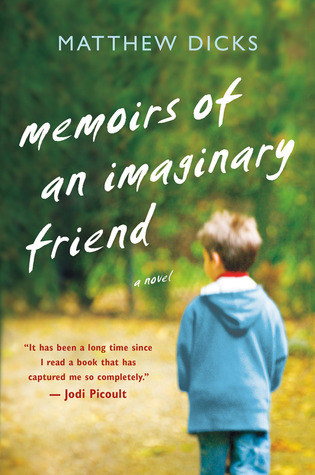Today, I am asking my students to reflect on their favorite narration. We will be reading Garth Stein's The Art of Racing in the Rain. It's a great family story, but it is unique in the sense that it is told from the point of view of the family dog. Their favorite narrator can be a first-person narrator that is a character in the novel, or it can just be a novel whose third-person perspective is unique or clever.
1. Who is your favorite narrator? What is your favorite narration?2. Tell readers about the novel and the narration.
3. Why is this your favorite? Why might others appreciate it as well?
 One of my favorite narrators is definitely Budo from Matthew Dicks's Memoirs of an Imaginary Friend. In Dicks's novel, imaginary friends are real. Not only are they real, but they can also interact with every other imaginary friend. In a world where imagination is real, Budo is an excellent tour guide. Budo is the imaginary friend of the autistic Max. Since imaginary friends are exactly how their child sees them, Budo is a very smart humanoid who can walk through doors and can exist in a space without Max. Other imaginary friends are not so lucky. Some are two dimensional, while others are freakish creations. While others are restricted to exist with their child, Budo has the luxury of walking around town while Max is asleep. He can visit gas stations and hospitals observing human life and checking out imaginary friend support groups for those whose children are sick and dying in the pediatric ward. Budo is also rare in the fact that he is the oldest imaginary friend. Max has had him for years. Most do not last as long since their children gradually do not need them any more and disappear. Budo has even witnessed imaginary friends come and go in as short as ten minutes.
One of my favorite narrators is definitely Budo from Matthew Dicks's Memoirs of an Imaginary Friend. In Dicks's novel, imaginary friends are real. Not only are they real, but they can also interact with every other imaginary friend. In a world where imagination is real, Budo is an excellent tour guide. Budo is the imaginary friend of the autistic Max. Since imaginary friends are exactly how their child sees them, Budo is a very smart humanoid who can walk through doors and can exist in a space without Max. Other imaginary friends are not so lucky. Some are two dimensional, while others are freakish creations. While others are restricted to exist with their child, Budo has the luxury of walking around town while Max is asleep. He can visit gas stations and hospitals observing human life and checking out imaginary friend support groups for those whose children are sick and dying in the pediatric ward. Budo is also rare in the fact that he is the oldest imaginary friend. Max has had him for years. Most do not last as long since their children gradually do not need them any more and disappear. Budo has even witnessed imaginary friends come and go in as short as ten minutes.Budo is my favorite because he offers a unique perspective on life. He mostly spends time with Max, who is unable to communicate for himself due to his autism. Budo is there to help Max cope. While simple things like which flavor popsicle can launch Max into a panic, Budo is there to whisper into his ear that blue is the best option. From coping with bullies to taking spelling tests, Max relies on Budo, which is why Budo is able to exist so much longer than his fellow imaginary friends. However, when Max gets kidnapped, the tables are turned. Budo knows that Max will keep him in existence forever, but is that worth keeping Max away from his family? Or will Budo help Max escape, meaning that Max might learn that he can help himself and therefore not need Budo anymore?
Matthew Dicks's narrator is one of my favorites. It's a great viewpoint into a fantasy world while also staying rooted in contemporary life. It's a great read for anyone. This is one of the few books that ever made me cry because it was over.



